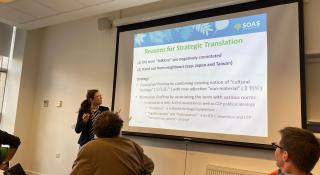Breadcrumbs navigation
Postgraduate workshop on International Migration Politics, including the IPMRD best book and best article awards
On 21 October 2019 Dr Paul Goode (University of Bath) and Dr Maria Koinova (University of Warwick) organised a one-day postgraduate workshop within the BISA working group on the International Politics of Migration, Refugees and Diaspora (IPMRD) in London. The workshop gathered an impressive group of nine postgraduate students from a variety of international academic institutions in the UK, France, Switzerland, Ireland, Italy, and Turkey, and members of the governance of the working group.
In the beginning of the day, the first IPMRD working group awards were presented for best book and best articles published in 2018. Dr Sara de Jong (University of York, chair of the committee) announced that the best book award went to: Anna Boucher and Justin Gest (2018). Crossing Borders: Comparative Immigration Regimes in a World of Demographic Change. Cambridge: Cambridge University Press.
Sara de Jong, Chair of the IPMRD Best Book Award jury said:
“This is both an original and ambitious piece of work. We were impressed by the book’s scope, specifically its insistence on developing a taxonomy of immigration regimes that also includes the global South as an important corrective to the ethnocentric accounts that have so far been dominant.”
Honorable mention was given to the book by Maurice Stierl (2018). Migrant Resistance in Contemporary Europe. London: Routledge. Sara said:
“This is a timely activist-academic account of migrant resistance at and beyond the borders of contemporary Europe, based on a methodologically robust multi-sited ethnographic study.”
Dr Foteini Kalantzi (University of Oxford, member of the committee) presented the best article award that went to: Katharina Lenner and Lewis Turner (2018). “Making Refugees Work? The Politics of Integrating Syrian Refugees into the Labour Market in Jordan.” Middle East Critique 21(1): 65-95.
Amanda Beattie, Chair of the best article judging committee, said:
“In making our selection the committee was impressed by the multidisciplinary appeal of the article. It was made exceptionally clear how the work applied to scholars beyond IR and spoke to debates in sociology, anthropology, and even economics. What is more, the article clearly contributed to ongoing debates in Migration Studies in an innovative fashion leaving scope for more research on the topic. With this in mind, the committee also noticed, and was very impressed by, the high level of empirical work that supported the argument(s) being made. The authors, in producing this article, demonstrated a high level of attention to detail, showcasing the emergence problems their case study analysis revealed.”
The rest of the day was dedicated to presentations and discussions alongside three major themes: The Politics of Migration and Refugees; Diasporas in Governance and Integration; and Economic Approaches to Migration Governance. Papers speaking to the first two themes were based exclusively on qualitative methods, those to the third theme – on quantitative analysis of surveys. Scholars associated with the governance of the IPMRD working group – Dr Maria Koinova (Chair), Dr Foteini Kalantzi (Secretary, University of Oxford), Dr Sara de Jong (University of York), and Dr Paul Goode provided tailor-made comments to each paper.
Within the first theme Maissam Nimer discussed how the relationship between civil society and the state was transformed when governing the language education of Syrian refugees in Turkey. Clothilde Facon argued that donor politics towards the recent refugee flows from Syria in Lebanon has been strongly shaped by foreign policy considerations, less so by humanitarian concerns. Hirotaka Fujibayashi presented a comparative analysis of Gulf state politics in the Middle East and the evolution of their migration diplomacy.
Within the second theme Catherine Craven presented her theory of diaspora as a “category of practice” in multi-scalar security governance, drawing evidence from the Tamil diaspora. Lola Guyot, also using insights from the Tamil diaspora, showed how diaspora mobilisations could be conducive to host-land integration. Palmo Brunner demonstrated her work in mapping the transnational mobilizations of the Tibet diaspora in online spaces.
Within the third theme, Theodora Tsankova presented a co-authored paper with Mirjam Baechli, an econometric analysis testing how introducing measures of labour protection in Switzerland brings more pro-immigrant attitudes, apart from municipalities with more low-skilled population. Michele Cantarella presented another econometric analysis based on data from the International Organization of Migration, and showed that rescue-deterrent policies, recently introduced in Italy, have had only minimal effect on the migration flows through the Mediterranean. Seun Adebayo concluded the session by speaking about how EU education policies towards migrants are implemented in Ireland.
For further information you can download the workshop programme below.


